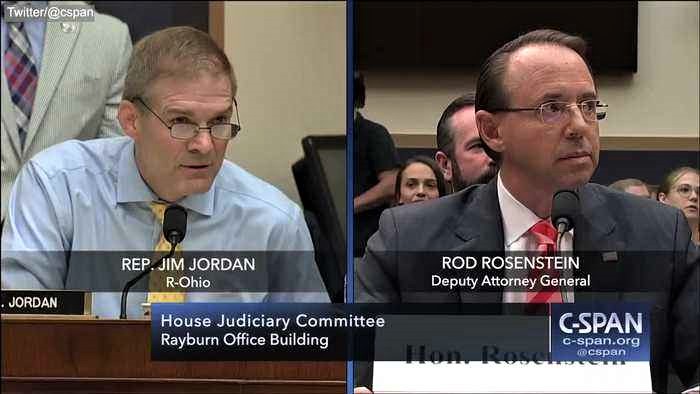This is what passes for civil discourse in the current House Judiciary Committee.

Ohio representative and House Freedom Caucus founder, Jim Jordan (R), accused Deputy Attorney General Rod Rosenstein of hiding information and documents requested by the committee regarding the FBI’s Hillary Clinton e-mail investigation.
Rosenstein politely but firmly responded, “I’m not trying to hide anything.”
Rosenstein and FBI Director Christopher Wray, both personally appointed by President Trump, demonstrated courtesy and notable restraint in the face of intimidation and threats by Jordan and South Carolina Representative Trey Gowdy (R).
CBS News reported (June 28), “In a particularly heated exchange… Jordan accused Rosenstein of having personally redacted items relating to ongoing investigations as well as claims that Rosenstein was not complying with Congressional requests, saying, ‘you have seven days to get your act together.’ Jordan was referring to a resolution on the House floor threatening to hold Rosenstein in contempt. …
“ ‘I’ve heard you make those kind of allegations publicly on TV. Mr. Jordan, I am the Deputy Attorney General of the United States, ok? I’m not the person doing the redacting. I’m responsible for responding to your concerns, as I have. Whenever you brought issues to my attention I have taken appropriate steps to remedy them,’ said Rosenstein. ‘When you find some problem with production or with questions, it doesn’t mean that I’m personally trying to conceal something from you. It means we’re running an organization that’s trying to follow the rules.’
“Rosenstein pushed back further, saying, ‘I appreciate your concerns, but your use of this to attack me personally is deeply wrong.’ ”
Committee member Gowdy was particularly vociferous, literally, shouting at a man with an impeccable record of honest service to the country and the law.
Near the end of another round of threats to hold Rosenstein in contempt, the deputy attorney general respectfully added, “We are not in contempt of this Congress and we are not going to be in contempt of this Congress.”
Watching this exchange, I was embarrassed and ashamed by the disrespect shown by several committee members, principally republicans, toward the two highest law enforcement officials in the country. Throughout some five hours of this Republican-led show trial, both Wray and Rosenstein remained calm and courteous to all committee members.
Sadly, we’ve seen these kinds of false attacks before when, in 1954, Senator Joseph McCarthy accused the Army of hiding communists within its ranks.
“It may be tempting,” ethicist Michael Josephson says, “to dismiss manners as merely rules of etiquette, but that would understate the fundamental way in which civility and courtesy facilitate constructive human relationships.
“To translate the moral principle of respect into action,” Josephson writes, “we need to be sensitive to various ways we demonstrate respect for others:
– “Acknowledging their essential and intrinsic value as human beings by treating them with courtesy, politeness, civility and restraint.
– “Judging people on the content of their character and their skills and abilities, not their race, religion, political beliefs, ethnicity, gender, sexual orientation, physical appearance or disabilities.
– “Treating ideas, opinions, and advice respectfully and with due consideration. Within the bounds of reason, it is respectful to hear people out, to listen to them and consider what they have to say with an open mind.
– “Acknowledging the claim of others to be free from unwanted intrusions on their time or privacy. It is disrespectful to be intrusive, meddlesome, rude, or offensive and to demand that people agree with you, take your advice, or continue to listen to you once they indicate they have heard enough.”
However, Josephson adds, “The moral duty to be tolerant should not be construed to prevent the formation of judgments about people and their character. Nor does it require that we tolerate every manner of offensive behavior.”
Practicing the principles of respect can sometimes require some self-restraint. However, when we face personal attacks, threats and intimidation, we should endeavor to respond respectfully as well as resolutely.
FBI Director Wray and Deputy Attorney General Rosenstein offered an example all of us should aspire to.
Comments










